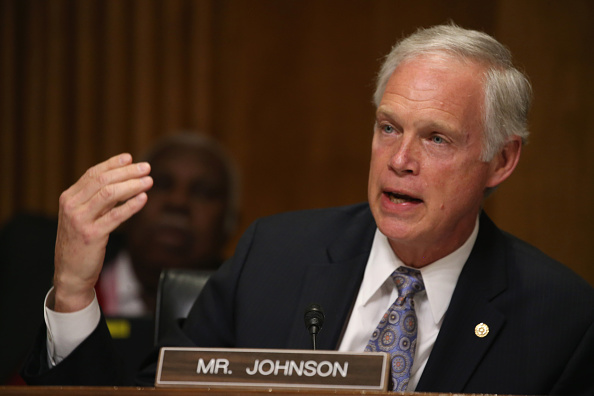Data presented on Capitol Hill by an attorney representing three Department of Defense (DoD) whistleblowers show dramatic increases in medical diagnoses among military personnel, raising questions about possible links to COVID-19 vaccines soldiers were required to take.
During a January 24 roundtable hosted by Sen. Ron Johnson (R-WS) that was live-streamed on the Internet, medical experts shared their perspectives on COVID-19 vaccine efficacy and safety.
Johnson, ranking member of the Permanent Subcommittee on Investigations of the Senate Committee on Homeland Security and Governmental Affairs, wrote to DoD Secretary Lloyd Austin, stating he received testimony from Thomas Renz, an attorney representing the three Pentagon whistleblowers, who are physicians, on February 1.
“Based on data from the Defense Medical Epidemiology Database (DMED), Renz reported that these whistleblowers found a significant increase in registered diagnoses on DMED for miscarriages, cancer, and many other medical conditions in 2021 compared to a five-year average from 2016 – 2020,” wrote Johnson.
“For example, at the roundtable, Renz stated that registered diagnoses for neurological issues increased 10 times from a five-year average of 82,000 to 863,000 in 2021,” wrote Johnson.
Other increases in registered diagnoses are listed in Johnson’s letter.
Myocarditis Diagnosis Missing
Johnson asked Austin to explain the discrepancies in the data, and missing data on myocarditis, an inflammation of the heart muscle reported in some young adults following COVID-19 shots.
“Renz also informed me that some DMED data showing registered diagnoses of myocarditis had been removed from the database,” wrote Johnson.
“Is DoD aware of increases in registered diagnoses of miscarriages, cancer, or other medical conditions in DMED in 2021 compared to a five-year average from 2016-2020?” asked Johnson. “If so, please explain what actions DoD has taken to investigate the root cause for the increases in these diagnoses.
“Have registered diagnoses of myocarditis in DMED been removed from the database from January 2021 to December 2021?” asked Johnson. “If so, please explain why and when this information was removed and identify who removed it.”
Neither he nor Johnson has received a response from DoD, Renz told Health Care News on March 8. Johnson’s office had not responded to requests for comments from Health Care News, as of press time.
PolitiFact: “Faulty Data”
Video of Johnson’s roundtable was widely circulated and reported, and PolitiFact, a fact-checking website owned by the Poynter Institute for Media Studies, Inc., a non-profit, published an article “fact-checking” an Instagram post citing figures stated by Renz at the roundtable, on January 31.
The DoD said the numbers showing a dramatic increase in military medical diagnoses were wrong, states the PolitiFact post by Jeff Cercone.
“They resulted from a glitch in the database, a military spokesperson said,” wrote Cercone.
“But Peter Graves, spokesperson for the Defense Health Agency’s Armed Forces Surveillance Division, told PolitiFact by email that ‘in response to concerns mentioned in news reports’ the division reviewed data in the DMED ‘and found that the data was incorrect for the years 2016-2020,’” wrote Cercone.
“The DMED system has been taken offline to ‘identify and correct the root-cause of the data corruption,’ Graves said,” wrote Cercone.
Convenient Glitch?
To believe the “glitch narrative” you have to accept several absurd assertions, says Renz.
“The DoD said the numbers were wrong from 2016-2020 but then correct in 2021,” said Renz. “The DMED database is monitored by an entire division of the military and numerous sub-agencies throughout DHHS (including Fauci and the CDC). It is also cited in peer-reviewed articles and scientific literature.
“For an ongoing glitch to have occurred for those 5 years we have to believe that none of these people noticed an error that, according to the updated numbers, was over 2,000% in some instances,” said Renz. “That includes the year of COVID—2020—when Fauci and crew claimed to be following the science to keep us safe. This leaves us with only two conclusions, either Fauci and the others monitoring the database in 2020 were well beyond grossly negligent or, more likely, they are corrupt and covering up the truth,” said Renz.
There is also a possible conflict of interest, says Renz.
“I can only speculate but I do know that there are potential conflicts,” said Renz. “For example, the Secretary of Defense earned nearly $300k in 2020 sitting on the board of a health care company that we believe is making quite a bit from COVID subsidies.”
What Data Could Explain
The Renz data contain diagnoses that can not currently be traced to COVID-19 shots, and some that can, says Joel S. Hirschhorn, author of Pandemic Blunder and the Pandemic Blunder Newsletter on Substack.
“I would rather see the emphasis on those diseases/illnesses that do connect to the COVID vaccines, such as myocarditis and several neurological conditions,” Hirschhorn told Health Care News. “In my research, I have tried to explain how the vaccines cause problems, such as intense micro blood clots that we know through blood testing is caused by the vaccines; these micro clots in small blood vessels throughout the body can greatly impede oxygen getting to all organs and the brain, thus leading to a host of impacts, including heart attacks and strokes.”
It is also important to get mortality reports, says Hirschhorn.
“[C]ase data cannot be the full story; there should have been a lot of deaths from several of the vaccine-induced health impacts, even for young, healthy military people,” said Hirschhorn. “Where are the mortality data?”
Bonner R. Cohen, Ph.D. (bcohen@nationalcenter.org) is a senior fellow at the National Center for Public Policy Research.
Internet info:
Sen. Ron Johnson’s Letter to Defense Secretary Lloyd Austin, February 1, 2022: https://www.ronjohnson.senate.gov/services/files/FB6DDD42-4755-4FDC-BEE9-50E402911E02
This article was updated on March 8, 2022.





















[…] post Data Shows Military Medical Disorders Jumped in 2021 appeared first on Heartland Daily […]
[…] Military Data on Vaccine Adverse Effects Disappears […]